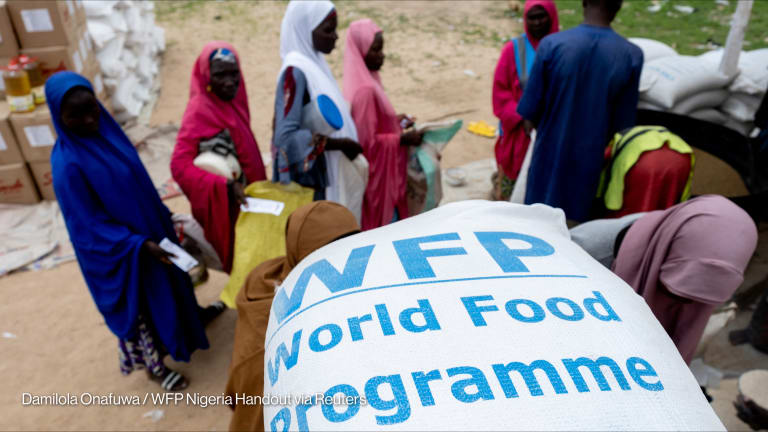UN food security committee adopts guidelines on food systems and nutrition

The United Nations’ Committee on World Food Security endorsed a new policy document Wednesday aimed at guiding the transformation of global food systems to address malnutrition and achieve related Sustainable Development Goals by 2030.
The Voluntary Guidelines on Food Systems and Nutrition, or VGFSyN, were developed to support implementation of the “UN Decade of Action on Nutrition” and to “help ensure that diets needed for adequate nutrition are accessible, available, affordable, safe and of adequate quality and quantity.” They were also designed to be “conforming with beliefs, culture and traditions, dietary habits, and preferences of individuals, in accordance with national and international laws and obligations.”
The guidelines are not legally binding for member states, and the Committee on World Food Security, or CFS, cannot do more than “encourage” governments to take them up, but they are meant to serve as a reference point for evidence-based guidance. They were endorsed at the 47th session of CFS, originally scheduled to take place in Rome in October but instead held virtually this week.
Hans Hoogeveen, chair of the CFS Open-Ended Working Group on Food Systems and Nutrition, called the document a “concrete tool” for governments, U.N. agencies, civil society, the private sector, and financial institutions to provide guidance, policies, and interventions for addressing malnutrition through a holistic food system perspective.
“These guidelines represent a wide range of recommendations aimed at promoting policy coherence and reducing policy fragmentation between sectors such as agriculture, health, education, environment, gender, social protection, trade, and employment, all of which have an impact on food systems and all of which have to be addressed at the national and local level,” Hoogeveen said. “It’s a historic moment because the guidelines address all the dimensions of the food system.”
The guidelines highlight the importance of governance; sustainable food supply chains for healthy diets; equal and equitable access to healthy diets; food safety; nutrition education; gender equality and women’s empowerment; and resilience in humanitarian contexts to achieve sustainable food systems.
The process to develop the VGFSyN began in 2015 and included meetings in Rome — where the Food and Agriculture Organization, CFS’ host agency, is based — as well as six regional consultations to ensure the guidelines would address a diversity of regional and national priorities and needs. An initial draft was released in March 2019, but the process was paused during the first part of the COVID-19 pandemic. Starting later in 2020, three rounds of formal negotiations took place, in September, December, and last month.
A variety of organizations participated in the consultations, including other U.N. bodies such as FAO, the World Food Programme, the International Fund for Agricultural Development, U.N. Nutrition, the World Health Organization, and UNICEF. Civil society and private sector observers also participated.
Negotiations on the draft were closed last week, and the guidelines were endorsed Wednesday morning CET. A debate in the afternoon among delegates and stakeholders at CFS’ 47th session was meant to focus on proposals for promoting the dissemination, use, and application of the VGFSyN but instead led to disagreements among member states around language in the document that had already been approved.
Delegates nearly reopened negotiations to make revisions to the text, and members of the civil society mechanism expressed their discontent with some aspects of the process. They called for their “dissatisfaction” to be formally recorded in the session’s final report.
“We also observe that a number of countries have not approved the guidelines,” said Hamadi Mohamed Abba, a civil society representative from Mali.
Part of our The Future of Food Systems series
Find out how we can make food fair and healthy for all. Join the conversation using the hashtag #FoodSystems and visit our The Future of Food Systems page for more coverage.
Maximo Torero, chief economist at FAO, said that the negotiation process caused language in the VGFSyN to be “diluted” in some sections, with compromises necessary to get the document approved by all involved member states. FAO will work with the CFS Secretariat to prepare a dissemination platform of all supporting evidence that can be accessible to users of the guidelines, he said.
“We want to do something concrete and action-oriented that will help to give the scientific base and support to the guidelines,” Torero said. “FAO encourages the use of the voluntary guidelines in conjunction with other specialized and evidence-based standards, guidelines, and recommendations.”
Meera Shekar, global lead for nutrition at the World Bank, said the way the guidelines bring together the food security and nutrition sectors is “a huge step forward.”
“It’s not something we’ve done well in the past,” Shekar said. “We know this is a very complex task: to describe the multiple dimensions of food systems; their interlinkages with food security, nutrition, and development; and the importance of nutrition to give each human being a chance to fully develop both their individual and national-level human capital. … Within this context, clearly what has been achieved cannot be underestimated.”
Shekar said that the private sector plays a “critical role” in shaping food systems and the World Bank hopes to work with it closely on implementation of the VGFSyN.
“The most effective thing to do is to invest in prevention before a catastrophe strikes, and that’s why the [World] Bank Group has been working with countries to build adaptive social protection programs that are connected to early warning systems and that can be scaled up in anticipation of shocks,” Shekar said. “Our strategy is to help build better, sustainable, and resilient food and health systems for healthy and well-nourished people, a healthy planet, and strong human capital.”
Visit the Future of Food Systems series for more coverage on food and nutrition — and importantly, how we can make food fair and healthy for all. You can join the conversation using the hashtag #FoodSystems.

Search for articles
Most Read
- 1
- 2
- 3
- 4
- 5








